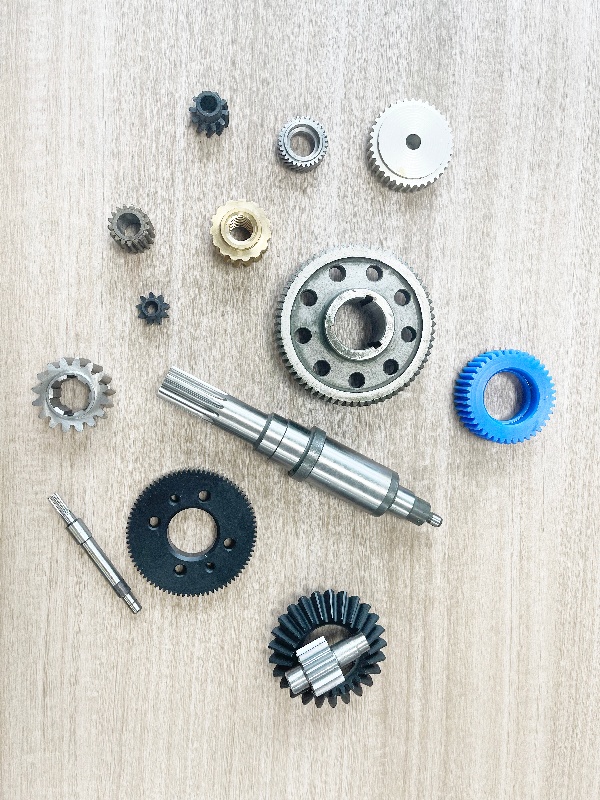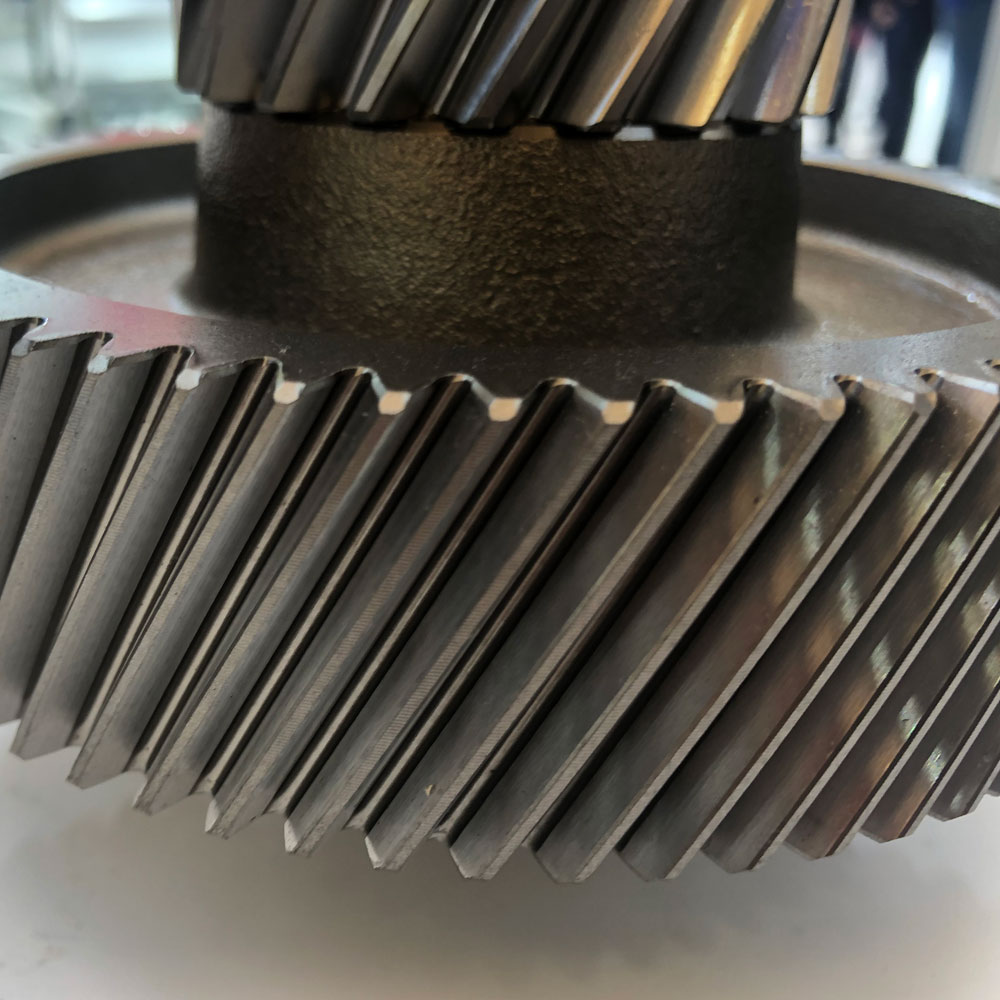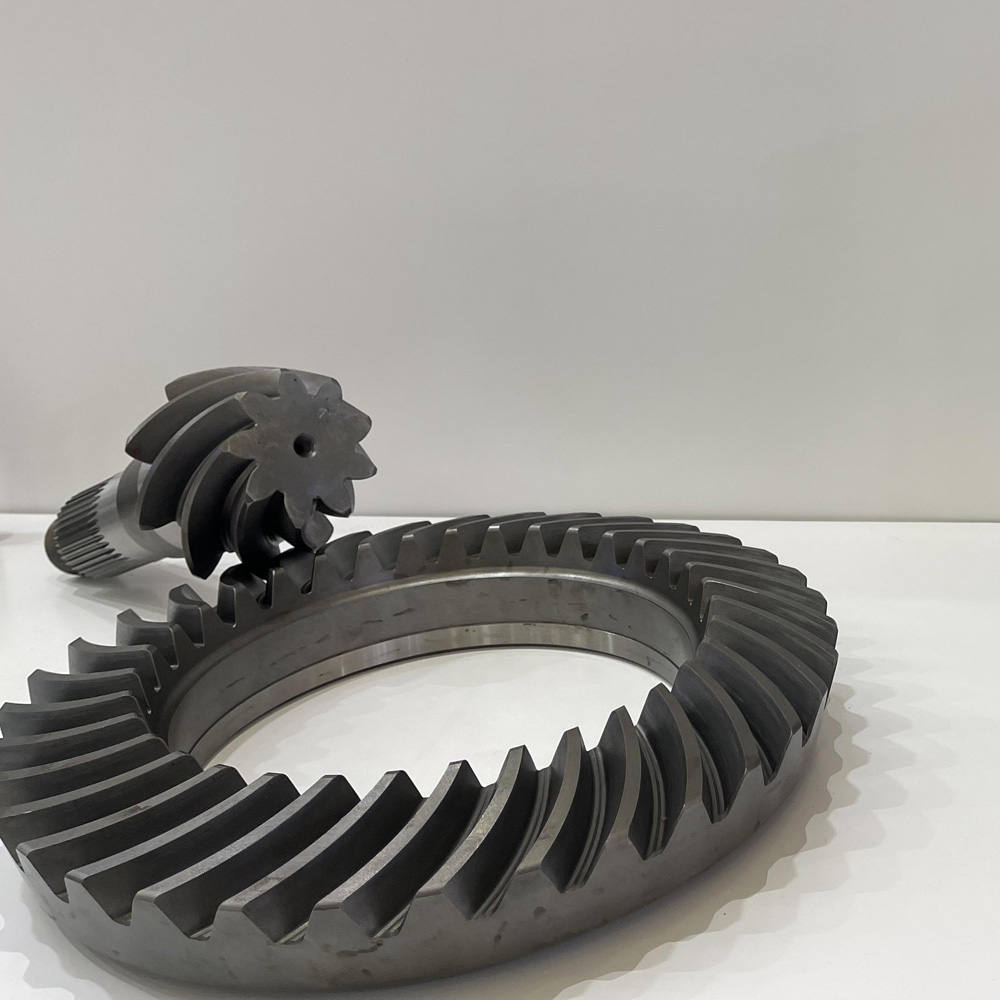Gears: Customized Services to Meet Diverse Needs
In modern industrial systems, gears serve as core components of transmission systems and are widely used in various types of machinery. Their performance, precision, and reliability directly impact the overall operational efficiency and service life of equipment. Whether in the automotive, aviation, wind power, shipbuilding, construction machinery, or automation and precision instrument industries, gears play an indispensable role.
Types of Gears and Their Application Scenarios
Gears can be categorized into different types based on their structure, tooth profile, and transmission method. Common types include Spur Gears, Helical Gears, Spiral Gears, and Straight Bevel Gears, each with unique performance characteristics and suitable application fields.
1.1 Spur Gear (Straight Gear)
Spur gears are the most common type of gear, with teeth aligned parallel to the axis. They are simple in structure and easy to manufacture, making them suitable for parallel shaft transmission. Due to their low manufacturing cost, they are widely used in automotive transmissions, machine tools, agricultural machinery, and conveyor systems.

1.2 Helical Gear
Helical gears have teeth arranged in a helical pattern at an angle to the axis. This design increases the contact area during meshing, resulting in smoother operation, lower noise, and higher load capacity. Helical gears are commonly used in high-speed, heavy-load, and high-precision applications, such as aircraft engines, marine propulsion systems, and large industrial equipment.

1.3 Spiral Gear
Spiral gears are a special type typically used for transmission between crossed axes. With a spiral tooth profile, they enable efficient transmission between non-parallel, non-intersecting shafts. Spiral gears are often used in automotive differentials, machine tool spindle drive systems, and other applications requiring high transmission efficiency and spatial layout flexibility.

1.4 Straight Bevel Gear
Straight bevel gears are used for transmission between intersecting shafts. The teeth are straight and aligned with the cone surface. These gears feature a compact structure and high transmission efficiency, making them ideal for mechanical systems that require a change in transmission direction, such as automotive rear axle differentials, construction machinery steering systems, and industrial robots.

Gear Applications Across Industries
With the development of industrial automation and smart manufacturing, the application fields of gears continue to expand, and different industries exhibit increasingly diverse demands for gears.
2.1 Automotive Industry
The automotive industry is one of the largest users of gears. From engines to transmissions, differentials, and steering systems, almost every power transmission system relies on gears. Helical gears and spiral bevel gears are widely used in automotive transmissions and differentials, requiring high precision, wear resistance, low noise, and long service life. Automotive manufacturers have extremely high standards for gear quality, necessitating strict control over material selection, heat treatment processes, and machining accuracy.
2.2 Wind Power Industry
The wind power industry has a significant demand for gearboxes. The speed-increasing gearboxes in wind turbines are among the core components. Since wind power equipment is often installed in harsh environments—such as offshore, mountainous, or desert areas—the gears must exhibit high corrosion resistance, fatigue resistance, and load-bearing capacity. Spiral bevel gears and planetary gear systems are commonly used in wind turbine gearboxes, requiring high precision, strength, and good lubrication performance.
2.3 Construction Machinery and Heavy Equipment
In construction machinery such as excavators, bulldozers, and cranes, gears are primarily used in power transmission systems. These gears often need to withstand large loads and frequent impacts. Therefore, they are typically made from high-strength alloy steel or cast iron and undergo surface hardening treatments to enhance durability.
2.4 Aerospace Industry
The aerospace industry places extremely high demands on gear precision and reliability. Gears used in critical areas such as aircraft engines, landing gear systems, and navigation systems must have high precision levels and excellent fatigue resistance. Spiral bevel gears and helical gears are widely used in aerospace applications, often made from special materials such as titanium alloys and high-temperature alloys, and processed using precision grinding and inspection techniques.
2.5 Automation and Smart Manufacturing
With the advancement of smart manufacturing and Industry 4.0, the demand for gears in automation equipment is rapidly increasing. Precision gears are widely used in automated production lines, robotics, and CNC machines, particularly planetary gears and worm gear systems. These gears require high transmission efficiency, low noise, and fast response times, often made from stainless steel, plastic, or special alloys.
Customized Gear Design and Service Requirements
Due to the varying performance, size, material, and environmental requirements across industries, gears often need to be custom-designed and manufactured according to specific customer needs. Traditional standardized gears can no longer meet the diverse demands of modern industry, making customized gears the mainstream trend in market development.
3.1 Customer Requirements for Customized Gears
(1) High Precision Requirements: Especially in precision machinery, automation equipment, and aerospace fields, customers demand high gear precision, often requiring standards of DIN 5 or above.
(2) Diverse Material Selection: Depending on the application environment, customers may require gears made from carbon steel, alloy steel, cast iron, stainless steel, plastic, or ceramic materials to meet special needs such as corrosion resistance, lightweighting, and insulation.
(3) Special Process Treatments: To improve wear resistance, fatigue resistance, and lifespan, customers often request heat treatments (such as carburizing, quenching, nitriding), surface coatings (such as chrome plating, spraying), and precision grinding.
(4) Complex Structural Design: As equipment functions become more diversified, gear structures are becoming more complex—for example, non-circular gears, internal gears, and herringbone gears—requiring advanced design and machining capabilities.
(5) Rapid Response and Technical Support: In addition to the product itself, customers highly value the technical support capabilities of suppliers, including drawing analysis, parameter optimization, fault diagnosis, and maintenance advice.
3.2 Our Service Advantages
To meet the growing demand for customized gears, our company is committed to providing comprehensive gear solutions for customers. We have a professional gear design team, advanced manufacturing equipment, and a complete testing system, enabling us to offer personalized customization services based on specific customer needs.
(1) Professional Design Team: Our technical team has extensive experience in gear design and can perform precise modeling and simulation analysis based on customer operating conditions, loads, and speeds to ensure the scientific and feasible design.
(2) Advanced Manufacturing Equipment: We are equipped with CNC gear hobbing machines, shaping machines, grinding machines, and coordinate measuring instruments to ensure that gear machining accuracy and surface quality meet international standards.
(3) Strict Quality Control: From raw material procurement to finished product delivery, we have established a comprehensive quality management system and strictly adhere to ISO 9001 quality standards to ensure that each gear meets customer technical requirements.
(4) Diverse Material Options: We support the manufacture of gears using various materials, including carbon steel, alloy steel, stainless steel, cast iron, and plastic, meeting the application needs of different industries.
(5) Fast Delivery and After-Sales Service: We have established efficient production processes and logistics systems to ensure timely order delivery. At the same time, we provide comprehensive after-sales services, including technical consultation, fault diagnosis, and on-site support, to help customers solve practical problems.
4. Gear Quality Determines Equipment Performance, Professional Service Wins Customer Trust
As a key component of mechanical transmission systems, the quality of gears directly affects the efficiency, stability, and longevity of equipment. With the continuous development of industrial technology, customer demands for gears are becoming increasingly high, making customized, high-performance, and high-precision gears the mainstream of market development.
Our company has always adhered to a customer-oriented philosophy, providing high-quality gear solutions through professional technical capabilities, advanced manufacturing processes, and comprehensive after-sales services.
Whether you are in the automotive, wind power, construction machinery, aerospace, or smart manufacturing industry, we can provide you with tailored gear products and services. Choosing us means choosing professionalism, reliability, and efficiency. Let's work together to advance industrial transmission technology.


